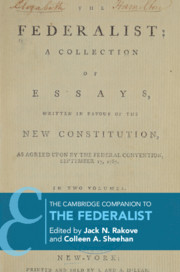Book contents
- The Cambridge Companion to The Federalist
- Other Volumes in the Series of Cambridge Companions to Philosophy
- The Cambridge Companion to The Federalist
- Copyright page
- Contents
- Contributors
- Acknowledgments
- Abbreviations
- Introduction
- 1 Publius and the Anti-Federalists:
- 2 John Jay, The Federalist, and the Constitution
- 3 “A Vigorous National Government”: Hamilton on Security, War, and Revenue
- 4 “The Known Opinion of the Impartial World”
- 5 The Federalist’s New Federalism
- 6 The Political Psychology of Publius
- 7 Montesquieu, Hume, Adam Smith, and the Philosophical Perspective of The Federalist
- 8 Madison’s Republican Remedy
- 9 The Republicanism of Publius
- 10 “The Interest of the Man”: James Madison’s Constitutional Politics
- 11 Politics Indoors and Out-of-Doors
- 12 “The Cool and Deliberate Sense of the Community”
- 13 Publius on Monarchy
- 14 The Genius of Hamilton and the Birth of the Modern Theory of the Judiciary
- 15 Publius’s Political Science
- 16 The Republican Form of Government in The Federalist
- Index
- Other Volumes in the Series of Cambridge Companions to Philosophy
4 - “The Known Opinion of the Impartial World”
Foreign Relations and the Law of Nations in The Federalist
Published online by Cambridge University Press: 28 February 2020
- The Cambridge Companion to The Federalist
- Other Volumes in the Series of Cambridge Companions to Philosophy
- The Cambridge Companion to The Federalist
- Copyright page
- Contents
- Contributors
- Acknowledgments
- Abbreviations
- Introduction
- 1 Publius and the Anti-Federalists:
- 2 John Jay, The Federalist, and the Constitution
- 3 “A Vigorous National Government”: Hamilton on Security, War, and Revenue
- 4 “The Known Opinion of the Impartial World”
- 5 The Federalist’s New Federalism
- 6 The Political Psychology of Publius
- 7 Montesquieu, Hume, Adam Smith, and the Philosophical Perspective of The Federalist
- 8 Madison’s Republican Remedy
- 9 The Republicanism of Publius
- 10 “The Interest of the Man”: James Madison’s Constitutional Politics
- 11 Politics Indoors and Out-of-Doors
- 12 “The Cool and Deliberate Sense of the Community”
- 13 Publius on Monarchy
- 14 The Genius of Hamilton and the Birth of the Modern Theory of the Judiciary
- 15 Publius’s Political Science
- 16 The Republican Form of Government in The Federalist
- Index
- Other Volumes in the Series of Cambridge Companions to Philosophy
Summary
Conventional accounts of The Federalist tend to overlook a critical and uncontroversial fact about the Constitution: the principal function it assigned the proposed new government was the conduct of the Union’s foreign affairs. By neglecting this simple point, readers too often miss the forest for the trees. The central task of The Federalist was not to offer a general blueprint for republican government but rather to demonstrate the depth of the Confederation’s failures in foreign affairs and to explain why the new federal government would govern more effectively in that realm without imperiling the republican commitments of the Revolution. This insight in turn reveals another: Even when The Federalist focuses on other, very different themes – whether in analyzing the general principles of federalism or the separation of powers, the importance of energy in the executive or independence in the judiciary, or the deficiencies of popular assemblies – foreign affairs remains its ultimate subject. These explorations were so many arguments to demonstrate that the federal government would neither repeat the Confederation’s foreign affairs blunders, nor pose a threat to the states and the republican principles upon which they were founded.
- Type
- Chapter
- Information
- The Cambridge Companion to The Federalist , pp. 114 - 163Publisher: Cambridge University PressPrint publication year: 2020

